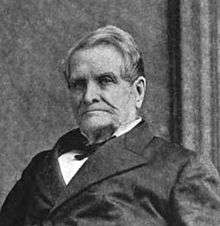Amasa J. Parker
| Amasa J. Parker | |
|---|---|
 Amasa Junius Parker | |
| Born |
Amasa Junius Parker June 2, 1807 Sharon, Connecticut |
| Died |
May 13, 1890 (aged 82) Albany, New York |
| Resting place | Albany Rural Cemetery, Menands, New York |
| Nationality | American |
| Alma mater | Union College, Schenectady, New York |
| Occupation | Politician |
Amasa Junius Parker (June 2, 1807 – May 13, 1890) was a U.S. Representative from New York and a justice of the New York Supreme Court.
Early life
Amasa Junius Parker was born in Sharon, Connecticut on 2 June 1807, the son of Anna (née Fenn) and Rev. Daniel Parker.[1] His father was a Congregational clergyman, and also a teacher in Greenville, New York, and elsewhere.[2] Amasa moved with his parents to Hudson, New York, in 1816. He was taught by private tutors and graduated from Union College, Schenectady, New York, in 1825. He was the principal of Hudson (New York) Academy from 1823 to 1827. Later he studied law, was admitted to the bar in 1828, and commenced practice in Delhi, New York. There he was a law partner of his uncle, Amasa Parker.[2]
Judge Parker was a member of the New York State Assembly (Delaware Co.) in 1834 (57th New York State Legislature). He was elected a regent of the University of the State of New York from 1835 to 1844.[3]
Political career
Parker was elected as a Democrat to the 25th United States Congress, serving from March 4, 1837, to March 3, 1839, as the representative from Delaware and Broome counties.[3] Afterwards he resumed the practice of law. In 1844, he moved to Albany, New York and was Judge of the Third Circuit from 1844 to 1847. In 1847 he was elected a justice of the New York Supreme Court for the third district, and in 1854 was one of the ex officio judges of the New York Court of Appeals.
He was one of the founders of the Albany (New York) Law School in 1851. He was twice defeated as a Democratic candidate for Governor of New York, in 1856 by Republican John Alsop King, and in 1858 by Republican Edwin D. Morgan. He was a delegate to the New York State Constitutional Convention of 1867. He was an active advocate of the reforms by which the court of chancery was abolished, law and equity powers vested in the same tribunal, and the practice of the courts simplified.[2]
He died in Albany, New York and was buried at the Albany Rural Cemetery.
Family
On 27 August 1834,[4] he married Harriet Langdon Roberts, daughter of diplomatist Edmund Roberts, emissary to the Far East, and granddaughter of Woodbury Langdon, one of New Hampshire's representatives to the Continental Congress. They had four children, among them General Amasa J. Parker, Jr. of the National Guards of the State of New York,[5] and Mary Parker who married Erastus Corning (1827–1897) and was the mother of Edwin Corning and Parker Corning.
Works
Sources
- United States Congress. "Amasa J. Parker (id: P000054)". Biographical Directory of the United States Congress.
References
- ↑ http://www.findagrave.com/cgi-bin/fg.cgi?page=gr&GRid=32516519
- 1 2 3
 Wilson, James Grant; Fiske, John, eds. (1900). "Parker, Amasa Junius". Appletons' Cyclopædia of American Biography. New York: D. Appleton.
Wilson, James Grant; Fiske, John, eds. (1900). "Parker, Amasa Junius". Appletons' Cyclopædia of American Biography. New York: D. Appleton. - 1 2 http://query.nytimes.com/gst/abstract.html?res=9F0CEFDD123BE533A25757C1A9639C94619ED7CF
- ↑ extracted from Noted living Albanians and state officials. A series of biographical sketches. (1891)
- ↑ http://www.accessgenealogy.com/scripts/data/database.cgi?ArticleID=43129&report=SingleArticle&file=Data
| United States House of Representatives | ||
|---|---|---|
| Preceded by William Seymour |
Member of the U.S. House of Representatives from New York's 20th congressional district 1837-1839 |
Succeeded by Judson Allen |
![]() This article incorporates public domain material from the Biographical Directory of the United States Congress website http://bioguide.congress.gov.
This article incorporates public domain material from the Biographical Directory of the United States Congress website http://bioguide.congress.gov.